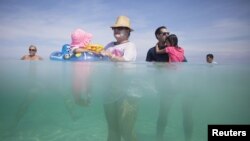Cubans are flocking to the beach in record numbers before a possible end to the U.S. travel ban that would open the gates to American tourists and bump up prices.
Until 2008, the Communist government banned Cubans from tourist hotels. Since then, the industry has been shocked at how many Cubans check in: 1.2 million permanent Cuban residents last year, up 23 percent from 2013.
The government's tourism officials have reported another increase this year, without providing figures.
Experts say many of those visiting beaches and hotels are able to afford it because they receive money from relatives living abroad, especially in the United States.
In a clear sign of the changing times, state television news recently ran a segment informing Cubans of the proper etiquette for vacationing in the same resorts as foreigners.
"Keep voices low, don't smoke, and don't litter," the newscaster said. "Hopefully when visitors return home they can say they saw more than beautiful beaches and classic cars; hopefully they can say how well-mannered Cubans are."
Varadero, about 100 miles (160 km) east of Havana, is Cuba's leading beach resort, boasting fine white sand and turquoise blue waters.
Cubans are now the number two source of tourists at Varadero, trailing only Canadians, and they are slightly ahead of Canadians nationwide.
"What's more, Cuban clients aren't just staying in the more standard hotels, but in the chain's best," said Narciso Sotolongo, deputy director of sales for Melia Hotels International in Cuba.
The Spanish hotel chain is Cuba's most important foreign partner in tourism, managing 27 properties on the island.
Nearly 80,000 Cubans have stayed at Melia properties this year, a 35 percent jump from this time last year. Since Melia opened to locals in 2009, the surge has averaged 32 percent a year.
More Americans
Cuba received a record 3 million foreign tourists in 2014, and visits were up 17 percent year-on-year in the first seven months of 2015.
More and more Americans are coming. Experts in the tourism industry predict 150,000 American visits by the end of this year, up from 91,000 in 2014, and many believe there could be massive growth in coming years.
As part of detente with a former Cold War enemy, U.S. President Barack Obama has eased restrictions on travel to Cuba. While tourism in Cuba is still specifically banned, some Americans manage to visit and find their way to a beach.
President Obama has already authorized direct flights to Cuba, cruise ships and ferry service as long as there is an educational purpose to travelers' stay in Cuba.
Legislation to lift the travel ban appears to be blocked by the Republican majority in Congress, but the lobby in favor of engagement with Cuba believes Obama's administration will do more to weaken restrictions and perhaps force the Republicans' hand.
The administration has shown virtually no interest in prosecuting Americans for vacationing in Cuba and the tourism industry is preparing for an eventual lifting of the travel ban.
"One of Obama's policy goals is to inject money into Cuba's private economy and this can be done through tourism and remittances," said Richard Feinberg, a Cuba expert and former national security advisor to U.S. President Bill Clinton.
Despite the domestic tourism boom, a weekend at Varadero is still out of reach for the majority of Cubans on a state salary that averaged $24 per month in 2014.
Hotels that formerly denied admittance to Cubans now offer special deals for locals, primarily to fill rooms in the summer months during international tourism's low season.
Jose Luis Perello, an economist and professor of tourism at the University of Havana, estimated the rise of domestic tourism is almost entirely linked to Cubans residing abroad, who send money to their relatives back in Cuba, allowing them a higher standard of living and to set up their own businesses.
In 2009, Obama eliminated restrictions on remittances and family visits for approximately 2 million Cuban-Americans.
Other economists attribute the growth more to President Raul Castro's economic reforms since he took over in 2008, which have boosted purchasing power for some, primarily through allowing small private businesses.
"You walk down the street in Varadero and realize it's totally full of Cubans, whereas before you would always see more foreigners. Things are changing for Cubans for the better," said Madeline Baro, standing on the beach with her young daughter.
Baro is married to a driver for a foreign company, a relatively high-paying job. Most Cubans lack that luxury.
"With the basic Cuban salary, you could never even dream of having a vacation with your family. Never," said Irenia Gomez Oviedo, a cashier. She said she and her family were able to spend two nights in Varadero thanks to money from her father, a private business owner.
Even with the help, they had to save for a year to pay for the all-inclusive hotel at a rate of $50 per night, she said.





